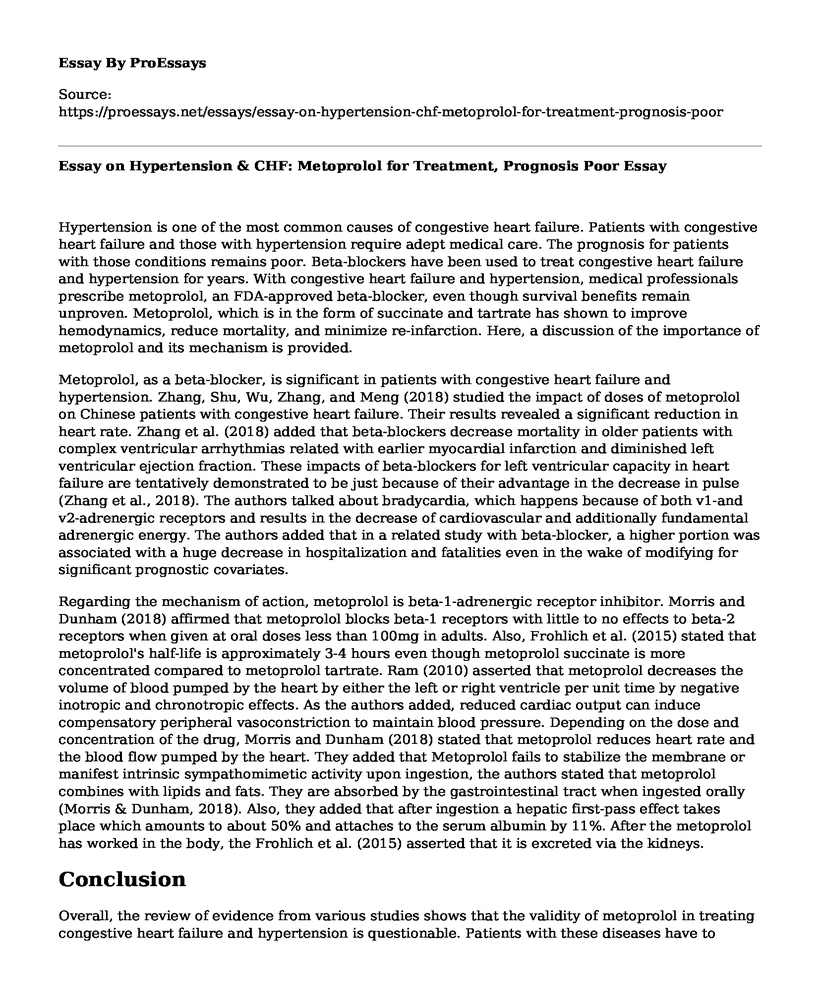Hypertension is one of the most common causes of congestive heart failure. Patients with congestive heart failure and those with hypertension require adept medical care. The prognosis for patients with those conditions remains poor. Beta-blockers have been used to treat congestive heart failure and hypertension for years. With congestive heart failure and hypertension, medical professionals prescribe metoprolol, an FDA-approved beta-blocker, even though survival benefits remain unproven. Metoprolol, which is in the form of succinate and tartrate has shown to improve hemodynamics, reduce mortality, and minimize re-infarction. Here, a discussion of the importance of metoprolol and its mechanism is provided.
Metoprolol, as a beta-blocker, is significant in patients with congestive heart failure and hypertension. Zhang, Shu, Wu, Zhang, and Meng (2018) studied the impact of doses of metoprolol on Chinese patients with congestive heart failure. Their results revealed a significant reduction in heart rate. Zhang et al. (2018) added that beta-blockers decrease mortality in older patients with complex ventricular arrhythmias related with earlier myocardial infarction and diminished left ventricular ejection fraction. These impacts of beta-blockers for left ventricular capacity in heart failure are tentatively demonstrated to be just because of their advantage in the decrease in pulse (Zhang et al., 2018). The authors talked about bradycardia, which happens because of both v1-and v2-adrenergic receptors and results in the decrease of cardiovascular and additionally fundamental adrenergic energy. The authors added that in a related study with beta-blocker, a higher portion was associated with a huge decrease in hospitalization and fatalities even in the wake of modifying for significant prognostic covariates.
Regarding the mechanism of action, metoprolol is beta-1-adrenergic receptor inhibitor. Morris and Dunham (2018) affirmed that metoprolol blocks beta-1 receptors with little to no effects to beta-2 receptors when given at oral doses less than 100mg in adults. Also, Frohlich et al. (2015) stated that metoprolol's half-life is approximately 3-4 hours even though metoprolol succinate is more concentrated compared to metoprolol tartrate. Ram (2010) asserted that metoprolol decreases the volume of blood pumped by the heart by either the left or right ventricle per unit time by negative inotropic and chronotropic effects. As the authors added, reduced cardiac output can induce compensatory peripheral vasoconstriction to maintain blood pressure. Depending on the dose and concentration of the drug, Morris and Dunham (2018) stated that metoprolol reduces heart rate and the blood flow pumped by the heart. They added that Metoprolol fails to stabilize the membrane or manifest intrinsic sympathomimetic activity upon ingestion, the authors stated that metoprolol combines with lipids and fats. They are absorbed by the gastrointestinal tract when ingested orally (Morris & Dunham, 2018). Also, they added that after ingestion a hepatic first-pass effect takes place which amounts to about 50% and attaches to the serum albumin by 11%. After the metoprolol has worked in the body, the Frohlich et al. (2015) asserted that it is excreted via the kidneys.
Conclusion
Overall, the review of evidence from various studies shows that the validity of metoprolol in treating congestive heart failure and hypertension is questionable. Patients with these diseases have to combine metoprolol with therapy to reach more aggressive goals. Due to the questionable nature of metoprolol as a beta-blocking agent, medical professionals need to look beyond global generalizations of the disease and instead focus on evaluating individual patients and specific beta-blocking agents.
References
Frohlich, H., Zhao, J., Tager, T., Cebola, R., Schellberg, D., Katus, H.A.,... & Frankenstein L. (2015). Carvedilol Compared With Metoprolol Succinate in the Treatment and Prognosis of Patients With Stable Chronic Heart Failure: Carvedilol or Metoprolol Evaluation Study. Circulation Heart Failure, 8(5):887-96. [PubMed]
Morris, J., & Dunham, A. (2018). Metoprolol. Retrieved from https://www.ncbi.nlm.nih.gov/books/NBK532923/
Ram, V. S. (2010). Beta-Blockers in Hypertension. The American Journal of Cardiology 106(12):1819-25 doi:10.1016/j.amjcard.2010.08.023
Zhang, Q., Shu, Q., Wu, L., Zhang, R., & Meng, Y. (2018). Dose-independent influence of metoprolol on cardiac and motor functions, QoL, and mental status in Chinese patients with CHF. Therapeutics and clinical risk management, 15, 23-31. doi:10.2147/TCRM.S188123
Cite this page
Essay on Hypertension & CHF: Metoprolol for Treatment, Prognosis Poor. (2023, Feb 12). Retrieved from https://proessays.net/essays/essay-on-hypertension-chf-metoprolol-for-treatment-prognosis-poor
If you are the original author of this essay and no longer wish to have it published on the ProEssays website, please click below to request its removal:
- Restraint Use Reduction and Instructional Methods
- Immigrant Children and Medical Care
- Care Delivery Strategies: RN, LPN & Nursing Assistant Roles - Research Paper
- Research Paper on Americans and Unhealthy Eating: Obesity and Lifestyle Diseases on the Rise
- Essay Example on Role of Academic Nurse Educator: Teaching & Clinical Proficiency
- Pennsylvania Leader Grapples With Graduating Seniors' Coronavirus-Related Requests - Essay Sample
- Esasy on Pros & Cons of Marijuana Use: A Debate







